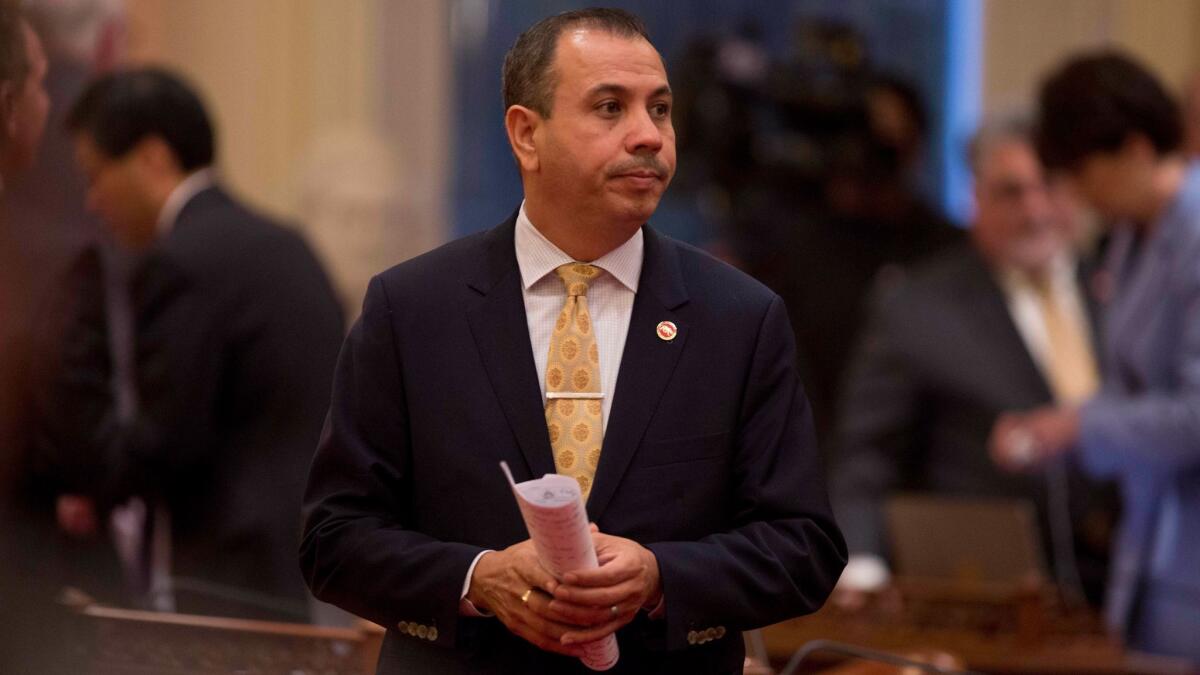California Senate settles retaliation lawsuit by former employee of Sen. Tony Mendoza

- Share via
SACRAMENTO — The California Senate agreed to pay $310,000 to settle a lawsuit filed by a former employee who alleged that the upper house and former Sen. Tony Mendoza fired and retaliated against her for reporting an allegation that the lawmaker sexually harassed her co-worker.
The accusation was the first in a wave of complaints against Mendoza, initially reported by the Sacramento Bee, that ultimately led the Artesia Democrat to resign from office in 2018 and prompted the Senate to begin to overhaul its internal policies for handing sexual harassment claims.
The new settlement with Adriana Ruelas, Mendoza’s former legislative director, marks the Senate’s second six-figure payout since the #MeToo movement helped expose a culture of harassment at the state Capitol.
“I am profoundly proud of her for having the courage to step forward and speak truth to power,” said Micha Star Liberty, an attorney for Ruelas. “Without her coming forward and demanding an investigation occur, one may never have been done. I sincerely hope that this resolution can close a very dark chapter where legislative employees were afraid to come forward and report misconduct for fear of retribution.”
Ruelas filed the lawsuit two years ago against the state Senate, Mendoza and two top Senate staff members. None of the defendants admitted any wrongdoing under the settlement, which will be paid with taxpayer dollars from the Senate’s operating budget.
Secretary of the Senate Erika Contreras confirmed the agreement with Ruelas, who now works as chief of staff to Assemblyman James Ramos (D-Highland), and described it as an amicable resolution in a written statement.
“We take all workplace misconduct allegations very seriously, and we have turned a corner in resolving claims such as these,” she said.
Mendoza did not respond to requests seeking comment.
Ruelas alleged that she was fired in September 2017 because she had informed her supervisor and Senate officials about what she alleged in the lawsuit to be a pattern of discrimination, harassment and inappropriate behavior by Mendoza toward a recent college graduate working in his office through a Sacramento State fellowship program.
The fellow is referred to as “Jane Doe” in the suit. The Times does not reveal the names of alleged victims of sexual harassment or assault.
Five months after Ruelas’ termination, the Senate announced that its investigation had substantiated complaints of Mendoza’s unwanted advances or sexually suggestive behavior toward the fellow and five other women, which included three of his onetime employees.
Mendoza, who has largely denied wrongdoing and accused his colleagues of treating him unfairly, stepped down days after the Senate publicly released the findings and as senators privately discussed ousting him from his position.
The Senate investigation did not substantiate Ruelas’ claim that she and two others were fired in retaliation for reporting Mendoza’s alleged behavior and other problems. Ruelas and her lawyer pushed back on the finding, claiming in the lawsuit that the conclusion was made without “sufficient basis” and testimony from a key witness.
Ruelas alleged that, in late 2016, an official with the fellows program asked her to watch out for the younger employee because Mendoza had “issues with women” in the past, according to her lawsuit.
The lawsuit describes several situations that Ruelas reported to her supervisor, including two times Mendoza allegedly asked the fellow to attend overnight work trips with him, making her uncomfortable. In two other instances, the senator allegedly invited the fellow over to his home to review resumes for a position she had applied for, according to the lawsuit.
Ruelas alleges that Mendoza’s chief of staff told her that he had been reporting the behavior to the Senate’s human resources department since February 2017. Her lawyer said in the lawsuit that Ruelas told a human resources official that the allegations were true in August of that year.
The lawsuit also states that Ruelas, the chief of staff and a scheduler in Mendoza’s office met with the human resources official and again detailed concerns about the senator’s alleged behavior at a meeting in late September 2017. All three employees were handed termination letters during the meeting, according to the lawsuit.
Ruelas and her lawyer argued that Mendoza, a former East Los Angeles elementary school teacher, later disparaged her in the press.
Mendoza was among four state lawmakers in California who were accused of sexual harassment and voluntarily gave up their seats in the Legislature.
Two Democratic Assembly members, Raul Bocanegra of Pacoima and Matt Dababneh of Woodland Hills, announced their resignations in late 2017 after being accused of sexual misconduct. Both denied wrongdoing, and legislative investigations later substantiated claims against both men.
Former Assemblyman Sebastian Ridley-Thomas, a Democrat from Los Angeles, resigned in December 2017 citing health issues. The following August, The Times reported that the lawmaker was the subject of two sexual harassment complaints at the time he stepped down. An Assembly investigation found that he likely made an unwanted sexual advance toward a female Capitol staffer.
Both houses of the Legislature committed to changing their policies to investigate sexual harassment claims after questions were raised about how the institution treated whistleblowers and responded to complaints.
The Legislature formed a new workplace conduct unit and appointed a panel of legal experts early last year to review and investigate reports of sexual harassment in the Senate and Assembly. Democratic leaders said the investigators would work independently within the Office of Legislative Counsel.
The scandals also inspired the Legislature to pass a law in 2018 to protect legislative staff who speak out about misconduct.
More to Read
Sign up for Essential California
The most important California stories and recommendations in your inbox every morning.
You may occasionally receive promotional content from the Los Angeles Times.











